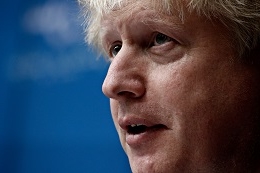
Comparisons between the UK’s newly-installed Prime Minister Boris Johnson and his US counterpart Donald Trump are being drawn the world over. Both are large personalities, populists, polarising figures and anti-establishment.
But despite the obvious similarities, it’s another political figure that the 55th British PM likes to align himself with – Winston Churchill – even borrowing his language to stoke antipathy towards the EU which saw the Leave vote narrowly triumph in the 2016 referendum.
A new paper by University of South Australia Adjunct Professor Jon Stratton explores the influence of the language used by Britain’s wartime hero on the Brexit vote and the unresolved cultural fears that the English still hold when it comes to invasion, occupation and sovereignty.
Prof Stratton, a British-born sociologist who is internationally recognised for his research on popular culture, says there are deep underlying reasons why the UK – and predominantly England – voted for Brexit.
As part of the Leave campaign, Boris Johnson and other Brexiteers played on lingering fears about what might have happened if Hitler and the Nazis had invaded England, using the same emotive language as Churchill used during World War 2, Prof Stratton argues.
Johnson’s admiration of Britain’s wartime leader Winston Churchill is no secret. In 2014 he wrote a biography of Churchill and clearly sees himself as his modern-day equivalent.
“In that biography and also in his Brexit campaign, Johnson even compared the EU to Hitler’s project,” says Prof Stratton.
“The same arguments that Churchill used in his stirring speeches were often repeated by the Leave campaigners, whipping up fears about loss of England’s sovereignty, defending the country against occupation by the EU and the threat of ‘invasion’ by immigrants.”
The fears of 1940 Britain still haunt the country today, Prof Stratton argues, and became a touchstone in the Brexit debates, both before and after the referendum.
He compares the results of the 2016 referendum with the 1975 referendum on whether Britain should remain in the Common Market, created in 1957 to allow free trade and free movement of capital and services.
“In the 1975 referendum, 67 per cent of people elected to stay in the Common Market. The general mood of the country was much clearer. Immigration was not an issue, but the Second World War was a constant theme and most people saw an integrated Europe as a key way of avoiding another war.”
In contrast, immigration was viewed as “the most salient issue” facing the country at the time of the Brexit referendum, peaking at 56 per cent in 2015, compared with 1994 when only 5 per cent of the British population thought immigration was a problem.
Prof Stratton also alludes to the influence of some of Britain’s most popular television shows among the baby boomers, who voted predominantly for Brexit.
In terms of age, 50 was the fault line, with 60 per cent of those aged 50-64 voting to Leave. These voters, Prof Stratton reasons, were likely to have a less critical and more rosy view of the United Kingdom’s past, a nostalgia for ‘homogenous’ Britain, the empire, and a mythical time when there was little violence and poverty.
This view is portrayed in the television series Dad’s Army, Midsomer Murders and The Vicar of Dibley, all of which celebrate a mythic English community, and a white Anglo-Saxon culture, where multiculturalism does not get a look in.
“It is worth noting that Midsomer Murders echoes the spirit of the 1950s where the world was more local, less crowded, simpler, and with more room for individuals and eccentricity. The county of Midsomer is purely an English fantasy,” Stratton says.
The conservative narrative of two films on Winston Churchill released in Britain at the time of Brexit – as well as Christopher Nolan’s celebratory film Dunkirk – also helped to legitimise the Leave vote, he argues.
For hundreds of years, the English have feared invasion, occupation and loss of sovereignty. The origin of this fear goes all the way back to 1066 when the Norman-French army invaded England.
These fears of invasion have been displaced onto immigration, Stratton concludes, manifesting in a concern over the breakdown of that mythically homogenous English society, resulting in Brexit.
“Interestingly, Scotland sees itself as very distinct from England, underlined in a 2014 referendum where 45 per cent voted in favour of independence from England and in 2016 where 62 per cent voted to remain in the EU. What is obvious is that Scotland does not share the same fears and anxieties about invasion as England.”
Stratton’s paper, titled “The language of leaving: Brexit, the Second World War and Cultural Trauma.” is published in the Journal for Cultural Research and available on open access.
Additional notes
Prof Jon Stratton has a PhD from the University of Essex but has worked in Australia for more than 30 years, in universities in NSW, Queensland, the Northern Territory, Western Australia and South Australia.
Winston Churchill stoked fears of invasion by the Nazis during WW2 but championed European unity in the post war period.








